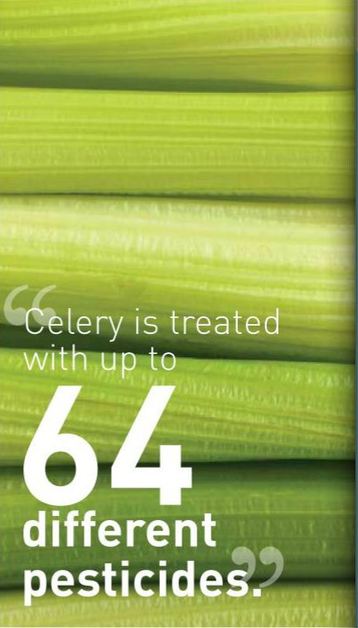
According to Alternative Medicine's November/December issue, "Every stalk (of celery) has traces of chlorantraniliprole, which kills caterpillars, moths, and beetles by over-stimulating their muscles to contract.
Chilean grapes have 34 different pesticides.
Blueberries are sprayed with 52 pesticides...
Sweet peppers have tested positive for 50 pesticide residues...
Strawberries, which act like sponges to absorb six carcinogens and 13 hormone distruptors, are especially problematic because they are so difficult to clean.
Pears have been found to have residue from over two dozen pesticides...
Apples are some of the most pesticide laden of non-organically grown produce, with samples from around the United States containing over 40 different pesticide residues."
These are the biggest offenders in terms of pesticides according to EWG (Environmental Working Group) and although they say the benefit of eating fresh fruits and vegetables outweighs the known risks of consuming pesticide residue, for people who can't afford organic or have no access to them, apples, pears and peaches may be better off being peeled to remove most of the residue.
Remove the outer layers of spinach if it's not organic before washing with warm water mixed with salt, and either lemon juice or vinegar. Berries, including strawberries, should be rinsed thoroughly and drained in a colander.
So, even though the Annals of Internal Medicine found little difference in the nutritional value of organic and conventional foods back in September 2012, I agree with Alternative Medicine magazine and go on the premise that organic food may not always contain more nutrients than conventional food but it's what they DON'T contain that puts them at a premium!

 RSS Feed
RSS Feed